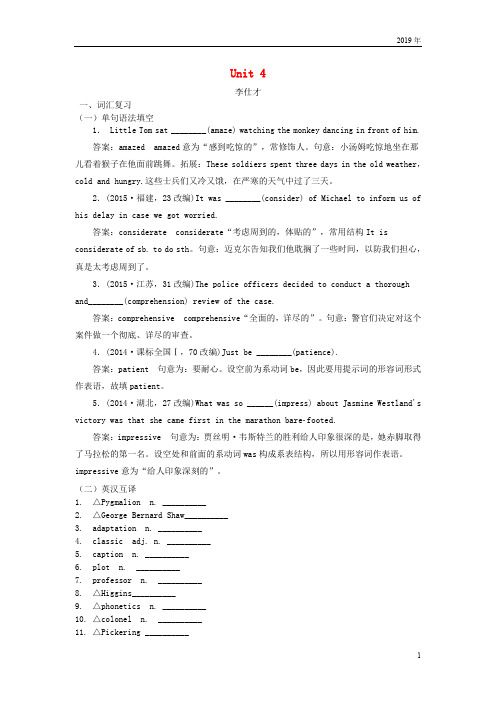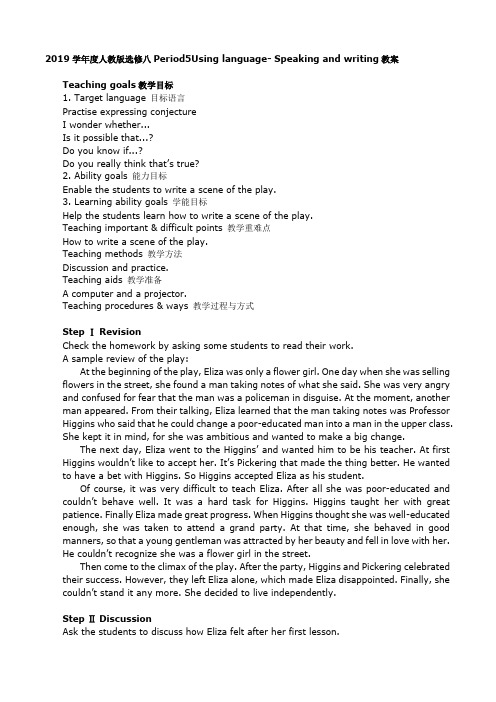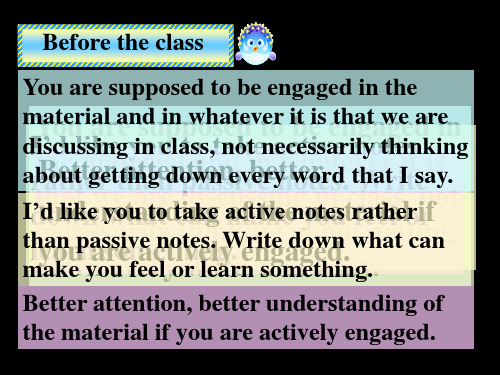2019高中英语人教版选修八Unit 4PygmalionPeriod5 Listening and speaking课件(55张)
人教版高中英语选修八-Unit4PygmalionUsinglanguage课件新

3.Showherin,MrsPearce. showin带或领……进来 Showherin,MrsPearce.皮斯太太,
领她进来。 Heshowedmeintoabedroom.他把
我领进一间卧室。 Heshowedmeout.他把我领了出
去。
showsb.in领某人进来,其反义词为: showsb.out领某人出去。 show构成的短语有: showsb.around领某人参观某地; showoff炫耀; showup出现,来到某处;揭露;显得好看
单项填空 Wedidn’tknowhistelephonenumber, otherwisewe_____him. A.Awouldhavetelephoned B.musthavetelephoned C.wouldtelephone D.hadtelephoned
disgusting: a.令人厌恶的;令人反感的 Hisdeceitisdisgusting;hetook everybodyin! 他的欺诈手段令人憎恶,弄得人人上当! That'sdisgusting. 真讨厌。
高中英语课件
madeofcanruohanxing
Wordspreview
pronounce vt.发…音;宣称
nail
n.指甲;趾甲;钉子
compromise n.&vi.妥协;折衷
horrible adj.可怕的;令人不愉快的
bathtub n.浴缸;澡盆
sob
vi.啜泣;抽泣
n.啜泣(声);抽泣(声)
Nowlistentothetapeand answerthefollowingquestions.
1CheckthelistofchangestoElizathat yourclassmadeonthebroad.Wereyour ideasthesameasProfessorHiggins’? 2Doesheconcentrateonher pronunciationratherthanhergrammar? Doyouthinkheiscorrect?Giveareason. 3Whatdoyouthinkabouthisteaching methods?Wouldyouliketobetaught byhim?Giveareason.
2019版高考英语 Unit 4 Pygmalion(词汇考查+词汇应用)(含解析)新人教版选修8

2019年Unit 4李仕才一、词汇复习(一)单句语法填空1. Little Tom sat ________(amaze) watching the monkey dancing in front of him.答案:amazed amazed意为“感到吃惊的”,常修饰人。
句意:小汤姆吃惊地坐在那儿看着猴子在他面前跳舞。
拓展:These soldiers spent three days in the old weather,cold and hungry.这些士兵们又冷又饿,在严寒的天气中过了三天。
2.(2015·福建,23改编)It was ________(consider) of Michael to inform us of his delay in case we got worried.答案:considerate considerate“考虑周到的,体贴的”,常用结构It is considerate of sb. to do sth。
句意:迈克尔告知我们他耽搁了一些时间,以防我们担心,真是太考虑周到了。
3.(2015·江苏,31改编)The police officers decided to conduct a thorough and________(comprehension) review of the case.答案:comprehensive comprehensive“全面的,详尽的”。
句意:警官们决定对这个案件做一个彻底、详尽的审查。
4.(2014·课标全国Ⅰ,70改编)Just be ________(patience).答案:patient 句意为:要耐心。
设空前为系动词be,因此要用提示词的形容词形式作表语,故填patient。
5.(2014·湖北,27改编)What was so ______(impress) about Jasmine Westland's victory was that she came first in the marathon barefooted.答案:impressive 句意为:贾丝明·韦斯特兰的胜利给人印象很深的是,她赤脚取得了马拉松的第一名。
2019学年度人教版选修八Unit4Period5Using language- Speaking and writing教案(7页)

2019学年度人教版选修八Period5Using language- Speaking and writing教案Teaching goals教学目标1. Target language 目标语言Practise expressing conjectureI wonder whether...Is it possible that...?Do you know if...?Do you really think that’s true?2. Ability goals 能力目标Enable the students to write a scene of the play.3. Learning ability goals 学能目标Help the students learn how to write a scene of the play.Teaching important & difficult points 教学重难点How to write a scene of the play.Teaching methods 教学方法Discussion and practice.Teaching aids 教学准备A computer and a projector.Teaching procedures & ways 教学过程与方式Step Ⅰ RevisionCheck the homework by asking some students to read their work.A sample review of the play:At the beginning of the play, Eliza was only a flower girl. One day when she was selling flowers in the street, she found a man taking notes of what she said. She was very angry and confused for fear that the man was a policeman in disguise. At the moment, another man appeared. From their talking, Eliza learned that the man taking notes was Professor Higgins who said that he could change a poor-educated man into a man in the upper class.She kept it in mind, for she was ambitious and wanted to make a big change.The next day, Eliza went to the Higgins’ and w anted him to be his teacher. At first Higgins wouldn’t like to accept her. It’s Pickering that made the thing better. He wanted to have a bet with Higgins. So Higgins accepted Eliza as his student.Of course, it was very difficult to teach Eliza. After all she was poor-educated and couldn’t behave well. It was a hard task for Higgins. Higgins taught her with great patience. Finally Eliza made great progress. When Higgins thought she was well-educated enough, she was taken to attend a grand party. At that time, she behaved in good manners, so that a young gentleman was attracted by her beauty and fell in love with her.He couldn’t recognize she was a flower girl in the street.Then come to the climax of the play. After the party, Higgins and Pickering celebrated their success. However, they left Eliza alone, which made Eliza disappointed. Finally, she couldn’t stand it any more. She decided to live independently.Step Ⅱ DiscussionAsk the students to discuss how Eliza felt after her first lesson.T: Now work in pairs and discuss the following questions.Show the following.1. How did Eliza feel about her first lesson?2. How do you think Mrs Pearce would comfort her?3. How would Professor Higgins and Colonel Pickering behave in the second lesson? Sample answers:1. I think she may be discouraged. She may think it is too difficult to learn formal English.2. Mrs Pearce would comfort or encourage her by saying: “Don’t worry, dear lady. It’s not that easy to become a member of the upper class. Keep trying and you are sure to succeed.”3. In the second lesson, Professor Higgins and Colonel Pickering would be more kind and patient.Step Ⅲ WritingT: Please turn to page 36 and look at the Part 2. Read the instructions and write a scene in which Professor Higgins gives Eliza her second lesson.Sample version 1:Act Two, Scene 3(Professor Higgins is waiting for Eliza to come to their second lesson. He looks up and smiles as she enters the room.)H: Ah, Eliza. Ready today for our second lesson?E: (slowly and carefully) Ye-es. We can begin now.H: Well. To begin with, the grammar I taught you last lesson, can you repeat it?E: Er..., Let me think for a while...H: What a silly girl! I can’t teach you any more. Maybe selling flowers in a street is just your suitable job.P: Oh, come, come Higgins. She is just a little girl and she has done her best. You’d better calm down and be more patient.E: (sobbing) I’m sure I can remember it. Give me a chance and I’ll write it down immediately.H: I must say it’s my fault and I beg your pardon. Let’s leave it alone and begin our new lesson.E: (gratefully) It’s very kind of you, Professor. I will work harder and I won’t let you down again.H: OK. Now let’s do some practice in pronunciation which can truly improve your position in society. So pay attention to the records and repeat.(Eliza listened to the record carefully but she just couldn’t follow.)E: I’m afraid I can’t follow it. Can you make it slowly?H: Impossible. Only by following this speed can you make a graceful lady.P: My good friend. How can she learn from it if she can’t follow it? It’s not only patience that a teacher needs, he must tak e his student’s level into account.H: Sorry. Maybe you are right. I’ll make it slowly.E: Much better now. Thanks to your guidance, I feel I’m not the person I used to be. H: Keep on and always remember you have a long way to go.E: How long will it take me to get all about language?H: It’s up to you. The more you want to succeed the shorter it will take.P: Higgins, I have to say that you have changed a lot. You are a real teacher now. And you, Eliza, you can’t expect too much. You must learn step by step. It’s your luck to have Higgins to be your teacher. He’ll do you much good.Sample version 2:Act Two, Scene 3(Professor Higgins is waiting for Eliza to come to their second lesson. He looks up and smiles as she enters the room.)H: Ah, Eliza. Ready today for our second lesson?E: (slowly and carefully) Ye-es...H: It seems that you are a little uncomfortable. Do you feel nervous?E: Oh no, I’m fine, but...H: (a little impatient) Why so uncomfortable, Eliza? You have made great progress as we all can see. Are you planning to give up?E: (raises her eyes) Oh no, I’m not. Let’s start, Mr Higgins. What would you like to show me today?H: (picks up a dress and throw it to Eliza) Put it on and I’ll tell you how to behave in a grand party.E: (hesitates) On a grand party? Is it too early? Oh, the dress is too large! I can’t even walk!H: What a poor girl! Of course you don’t have to keep it, if you are ready to be a flower girl again. For a well-educated girl, it is important to know how to deal with different situations in a proper way. For example when someone invite you to dance, always remember to say “I’d like to! Thank you.”E: Yes!H: Your English needs further improvement. No one will believe such a pronunciation comes from a well-educated girl.E: Pardon?H: OK, OK. That’s enough. Dance, please.E: (seeing Professor’s funny face and can’t help laughing) Ha, ha, ha...H: (angrily) Stop! You sound so rude and nobody will enjoy it! Silly!E: (stop laughing and act as Higgins) Like this?P: (enters the roo m) Oh, I can’t believe my eyes! Is it your masterpiece?H: It’s so simple.P: What a beautiful and graceful lady! May I have the honor to dance with you?H: (watching and smiling) What a masterpiece she will be!Step Ⅳ HomeworkAsk the students to summarize what they have learned in this unit and prepare for the next unit.附件I. PygmalionTwo old gentlemen meet in the rain one night at Covent Garden. Professor Higgins is a scientist of phonetics, and Colonel Pickering is a linguist of Indian dialects. The first betsthe other that he can, with his knowledge of phonetics, convince high London society that, in a matter of months, he will be able to transform the cockney speaking Covent Garden flower girl, Eliza Doolittle, into a woman as poised and well-spoken as a duchess. The next morning, the girl appears at his laboratory on Wimpole Street to ask for speech lessons, offering to pay a shilling, so that she may speak properly enough to work in a flower shop. Higgins makes merciless fun of her, but is seduced by the idea of working his magic on her. Pickering goads him on by agreeing to cover the costs of the experiment if Higgins can pass Eliza off as a duchess at an ambassador’s garden party. The challenge is take n, and Higgins starts by having his housekeeper bathe Eliza and give her new clothes. Then Eliza’s father Alfred Doolittle comes to demand the return of his daughter, though his real intention is to hit Higgins up for some money. The professor, amused by D oolittle’s unusual rhetoric, gives him five pounds. On his way out, the dustman fails to recognize the now clean, pretty flower girl as his daughter.For a number of months, Higgins trains Eliza to speak properly. Two trials for Eliza follow. The first oc curs at Higgins’ mother’s home, where Eliza is introduced to the Eynsford Hills, a trio of mother, daughter, and son. The son Freddy is very attracted to her, and further taken with what he thinks is her affected “small talk” when she slips into cockney. Mrs Higgins worries that the experiment will lead to problems once it is ended, but Higgins and Pickering are too absorbed in their game to take heed. A second trial, which takes place some months later at an ambassador’s party (and which is not actually staged), is a resounding success. The wager is definitely won, but Higgins and Pickering are now bored with the project, which causes Eliza to be hurt. She throws Higgins’ slippers at him in a rage because she does not know what is to become of her, thereby bewildering him. He suggests she marry somebody. She returns him the hired jewelry, and he accuses her of ingratitude.The following morning, Higgins rushes to his mother, in a panic because Eliza has run away. On his tail is Eliza’s father, now unhappily rich from the trust of a deceased millionaire who took to heart Higgins’ recommendation that Doolittle was England’s “most original moralist.” Mrs. Higgins, who has been hiding Eliza upstairs all along, chides the two of them for playing with the girl’s a ffections. When she enters, Eliza thanks Pickering for always treating her like a lady, but threatens Higgins that she will go work with his rival phonetician, Nepommuck. The outraged Higgins cannot help but start to admire her. As Eliza leaves for her fat her’s wedding, Higgins shouts out a few errands for her to run, assuming that she will return to him at Wimpole Street. Eliza, who has a lovelorn sweetheart in Freddy, and the wherewithal to pass as a duchess, never makes it clear whether she will or not.Ⅱ. My Fair LadyThe musical was based on George Bernard Shaw’s 1913 play “Pygmalion”. The following is the plot of the play.We find Eliza Doolittle (Audrey Hepburn) selling flowers and spewing out the most dreadful words in a Cockney accent. It is rea lly almost unbearable, but don’t turn the movie off as it doesn’t last too long. Audrey Hepburn is perhaps the most beautiful actress to ever grace the screen in my humble opinion. Here, she shines and is only a wall flower for the first part of the movie. Later she blossoms into an exquisite woman who could win the heart of any man. It is truly her best acting.Professor Henry Higgins (Rex Harrison) and Colonel Pickering discover her selling flowers and after Professor Higgins throws money into her flower basket we expect the two will never meet again. Eliza has other ideas and proudly marches up to the professor’s home and demands to be taught to speak like a lady.Colonel Pickering then makes a bet with Professor Higgins and says that if he can turn t his uncultured “gutter snipe” with a “simply ghastly” accent into a sophisticated, elegant duchess, he will pay for all the expenses. (Reminiscent of “Trading Places” to give a modern example). It is just irresistible to the professor and so he takes on a challenge for six months.Higgins’ arrogant attitude will make you laugh. He is humorously as unaware of other’s feelings as he is of his own. He is at first very unlikable, yet made me laugh through the whole movie. You will enjoy his eccentric view of life and cunning attitude as he tempts Eliza with chocolates.When you hear “I Could Have Danced All Night,” you will know why this will become one of your favorite musicals. “On the Street Where You Live” always makes me cry. The script is superb and humorous in so many places. You will find yourself crying, laughing, and becoming increasingly enchanted as the movie progresses. I love this line: “The great secret in life is not a question of good manners or bad manners, or any particular sort of manners, but having the same manner for all human souls.”—Professor Higgins Higgins and Eliza have quite a few passionate verbal exchanges which are quite amusing. Eliza says: “I want a little kindness.” and we immediately know that love is the only aspect missing from this relationship. Higgins has to learn to love and that to me is the undercurrent in this movie. While Eliza learns to speak well, Higgins learns to love well.Ⅲ. George Bernard Shaw (1856-1950)Irish dramatist, literary critic, a socialist spokesman, and a leading figure in the 20th century theater. Shaw was a freethinker, defender of women’s rights, and advocate of equality of income. In 1925 he was awarded the Nobel Prize for Literature. Shaw accepted the honour but refused the money.George Bernard Shaw was born in Dublin, where he grew up in something close to genteel poverty. “I am a typical Irishman; my family came from Yorkshire,” Shaw once said. His father, George Carr Shaw, was in the wholesale grain trade. Lucinda Elisabeth (Gurly) Shaw, his mother, was the daughter of an impoverished landowner. She was 16-years younger than her husband. George Carr was a drunkard —his example prompted his son to become a teetotaler. When he died in 1885, his children and wife did not attend his funeral. Young Shaw and his two sisters were brought up mostly by servants. Shaw’s mother eventually left the family home to teach music, singing, in London. When she died in 1913, Shaw confessed to Mrs. Patrick Campbell: “I must write to you about it, because there is no one else who didn’t hate her mother, and even who doesn’t hate her children.”In 1866 the family moved to a better neighborhood. Shaw went to the Wesleyan Connexional School, and then moved to a private school near Dalkey, and from there to D ublin’s Central Model School. Shaw finished his formal education at the Dublin English Scientific and Commercial Day School. At the age of 15, he started to work as a junior clerk. In 1876 he went to London, joining his sister and mother. Shaw did not return toIreland for nearly thirty years.Most of the next two years Shaw educated himself at the British Museum. He began his literary career by writing music and drama criticism, and novels, including the semi-autobiographical IMMATURITY, without much success. A vegetarian, who eschewed alcohol and tobacco, Shaw joined in 1884 the Fabian Society, served on its executive committee from 1885 to 1911. The middle-class socialist group attracted also H. G. Wells. The both writers send each other copies of their new books as they appeared. “You are, now that Wilde is dead, the one living playwright in my esteem,” wrote Wells after receiving Shaw’s THREE PLAYS FOR PURITANS (1901).In 1895 Shaw became a drama critic for the Saturday Review. Articles written for the paper were later collected in OUR THEATRES IN THE NINETIES (1932). Music, art, and drama criticism Shaw wrote for Dramatic Review (1885-1886), Our Corner (1885-1886), The Pall Mall Gazette (1885-1888), The World (1886-1894), and The Star (1888-1890). His music criticism was collected in SHAW’S MUSIC (1981). During this period he wrote CAESAR AND CLEOPATRA (1901) and THE PERFECT WAGNERITE (1898).Pygmalion was originally written for the actress Mrs. Patrick Campbell. Later the play became the basis for t wo films and a musical. (Shaw’s correspondence with the actresses Ellen Terry and Stella Campbell is available in book form.) Shaw’s popularity declined after his essay ‘Common Sense about the War’ (1914), which was considered unpatriotic. With SAINT JOAN (1924), his masterpiece, Shaw was again accepted by the post-war public. Now he was regarded as ‘a second Shakespeare’, who had revolutionized the British theatre. Shaw did not portray Joan of Arc, his protagonist, as a heroine or martyr, but as a stubborn young woman. And as in classic tragedies, her flaw is fatal and brings about her downfall. Uncommonly Shaw showed some sympathy to her judges. The play was written four years after Joan was declared a saint.In his plays Shaw combined contemporary moral problems with ironic tone and paradoxes, “Shavian” wit, which has produced such phrases as“He who can, does. He who cannot, teaches”, “England and America are two countries divided by a common language”, “Christianity might be a good thing if anyone ever tried it”, and “I never resist temptation because I have found that things are bad for me do not tempt me.” Discussion and intellectual acrobatics are the basis of his drama, and before the emergence of the sound film, his plays were nearly impossible to adapt into screen. During his long career, Shaw wrote over 50 plays. He continued to write them even in his 90s. George Bernard Shaw died at Ayot St. Lawrence, Hertfordshire, on November 2, 1950. He was cremated and it was his wish that his ashes be mixed with those of his wife, Charlotte — she had died seven years before, “an old woman bowed and crippled, furrowed and wrinkled,” as Shaw depicted her in a letter to H.G. Wells.Since the days of the silent films, Shaw had been a fan of motion-picture. He also played in the film Rosy Rapture — The Pride of the Beauty (1914). Shaw did not like much of the German film version of Pygmalion (1935), and the penniless producer and director Gabriel Pascal persuaded the author to give him the rights to make films from his plays. “Mr Pascal, you’re the first honest film producer I have ever met,” Shaw told him at their first meeting and gave him a pound note. Pygmalion, produced by Pascal and directed by Anthony Asquith and David Lean (uncredited), was a great success. In one article, Pascal was picked with the Pope and Hitler as one of the ten most famous men of 1938, but his career ended in the financial fiasco of the spectacle Caesar and Cleopatra (1945). Amongseveral other films inspired by Shaw’s plays were Saint Joan (1927), How He Lied to Her Husband (1931), Arms and the Man (1932), Major Barbara (1941), and My Fair Lady (1964). Pascal’s co-director in Major Barbara was David Lean, but for thousand pounds Lean agreed to give the full credit to Pascal.Ⅳ. Quotations from Bernard ShawBehind every successful man, there is a woman and behind every unsuccessful man, there are two.每个成功的男人后面都有一个女人;每个不成功的男人后面都有两个女人。
2019大一轮高考总复习英语(人教版)课件:选修8+Unit+4+Pygmalion

[ 佳作背诵]
请根据下面的内容,写一篇电影评论,向同学们介绍自己最喜欢的电影。
1.片名:《哈里·波特与火焰杯》(Harry Potter and the Goblet of Fire)。 2.剧情介绍:哈里·波特已经成为霍格沃茨魔法学校四年级的学生,并成长为 一位出色的魔法师。他参加了令人激动不已的三强争霸赛,接受了很多挑战,可他 没有想到这一切都是伏地魔的阴谋。
14.conventional adj. 15.harmony n.
将……分类
惯例的,常规的 协调,和谐;融洽
[ 话题短语]
1.classical literature古典文学
2.contemporary literature现代文学
3.popular literature大众文学 4.be regarded as被认为…… 5.make one’s acquaintance与……结识 6.in artistic terms从艺术的角度来说
3.评价:《哈里·波特与火焰杯》是哈里·波特系列电影中最精彩的一部。在
这部电影中,所有的演员都表演得很好。 参考词汇:霍格沃茨魔法学校Hogwarts School of Witchcraft and Wizardry;三强 争霸赛the Tri-wizard Tournament;伏地魔Voldemort;阴谋plot
幕
场 古典的
7.bestseller n.
畅销书
8.masterpiece n.
9.ending n. 10.adore vt. 11.elegant adj. 12.belief n.
杰作
结局 敬慕,崇拜,钟爱,很喜欢 高雅的,优雅的,文雅的 相信,信念;信条,信仰
2019教育人教版选修8 unit 4 PygmalionP2 Reading (共44张PPT)精品英语

sth. that you say, giving your opinion about
sth. or stating a fact
n. 谈论;言论;评述
remark
chance and the way it affects your life;
a large amount of money, goods, etc
n. 机会;运气;大笔的钱 fortune
a result or effect of an action, situation, etc
n. 结果;效果
outcome
correctly, or in a satisfactory way
adv. 适当地;恰当地 properly
very unusual, special, unexpected or
Better attention, better understanding of the material if you are actively engaged.
Unit 4 Reading
PYGMALION FATEFUL MEETINGS
Read the explanation and speak out the word
an important official who lives in a foreign
country to represent his or her own country
there, and who is officially accepted in this
position by that country
a piece of clothing
garment
n. (一件)衣服 (外套、裙、袍等) (pl) 服装
人教版高中英语选修八Unit 4 Pygmalion(4)课件 (共17张PPT)

Attention !!!
(2).过去分词构成的独立主格结构。如: He rushed into the classroom, his face covered with sweat. 他满脸是汗跑了进来。 His work finished, he prepared to go home. 干完活,他准备回家。 (3)也可用with复合结构 He was lying with his eyes shut. 他躺在那里,闭着眼。
5. He gave mc e a musical box at my birthday
party and I gave him a wonderful new coat i_n__r_e_t_u_r_n__.
Step 4
Grammar
Revise the Past Participle as Adverbial
in return in disguise in amazement in delight in particular
3. She stared at the priceless antique ring i_n__a_m_a_z_e_m__e_n_t_.
4. It was such a wonderful play – I enjoyed the musi_i_n_p_a_r_t_ic_u_l_a_r_.
1. words printed above or below a picture
caption 2. a piece of clothing garment 3. high sound made by blowing air with
your mouth whistle
4. made of wool woolen
2019年人教版选修8 unit 4 PygmalionP5 Listening exercise (共28张PPT)精品物理
(emphasizing each word) Do you think I don’t know anything! E: (very slowly and carefully too) Doo yoo think I don’t know anything? H: Now to the alphabet, my girl. Don’t _a_rg_u__e_ — just say it.
E: (continuing) Yes, why should she die of influenza? She _r_e_c_o_v_er_e_d__ from diphtheria the year before. I believe they done her in.
C: (turning to Eliza) Do you mean that? E: (getting enthusiastic) Yes, I do! What
F: Oh, how _fu__n_n_y_! E: (crossly) What’s wrong with that, young
man? I _b_e_t_ I got it right. C: I hope it won’t turn _c_o_ld__ though.
There’s so much flu about. E: My aunt _d_i_e_d_ of flu, so they said. But I
believe they done the old woman in.
C: Done her in? Please _w_h_a_t_ does that mean, Mr Higgins?
人教版高中英语选修八Unit 4 Pygmalion using language名师公开课市级获奖课件(11张)
Plot
Pickering made the bet with Henry. If Henry can turn Eliza into a lady in three months, Pபைடு நூலகம்ckering will consider Henry the greatest teacher alive and he also agrees to pay all the costs himself.
After the first lesson &her second lesson
Eliza student Higgins teacher Progress &hope
feels much better after talking with Mrs.Pearce
in a better mood …
Assignment
H: Ah Eliza. Ready today for our second lesson? E: (slowly and carefully) Ye-es. H: Well done, Eliza, that sounds better already. Don’t you think so, Pickering? P: Yes, indeed. H: Well. Let’s try our sentences again, shall we? Let’s see. There was “ a cup of tea”. E: A cu-up of te-ea. P: Excellent my dear. And first time too. H: Yes, indeed. Now let’s try “I don’t know anything”. E: I don’t kno-ow any-thing. H: Amazing progress. Don’t you think so, Pickering? She’s really listening. Now, let’s do the last sentence “The rain in Spain stays mainly on the plain.” H: Almost perfect. Just a little more work, Eliza, “stai-ays” and “plai-ain”. Again please. E: The rain in Spain stay-ays mainly on the play-ain. P: Wonderful. She’ll soon be perfect.
最新人教版高中英语选修8 Unit 4《Pygmalion》(period ⅰ)ppt课件
“You see,really and truly,apart form the things anyone can pick up, the difference between a lady and a flower girl is not how she behaves but how she's treated.I shall always be a flower girl to Professor Higgins, because he always treats me as a flower girl,and always will,but I know I can be a lady to you because you always treat me as a lady,and always will.”
【答案】 1.It means that when you believe the team can perform well,in some strange and magical way they can.And similarly,when you believe they can't perform well,they can't.
depends less on them than it does on
you.The performance you get from
people is no more or less than what you expect,which means you must always expect the best.As Goethe said, “Treat a man as he is and he will remain as he is.Treat a man as he can
2019学年度人教版选修八Unit 4PygmalionPeriod4 GrammarPPT课件(47张)
部分过去分词因来源于系表结构,作状语时 不表示 “被动关系”,其前不用being。这 样的过去分词及短语常见的有:lost(陷入某 种状态);seated(坐);hidden(躲); stationed(驻扎);lost/absorbed in (沉溺于); dressed in(穿着);tired of(厌烦)等。
(3) 作原因状语,可转换为as, since或 because等引导的状语从句。 e.g. The children, exhausted, fell asleep at once. 由于劳累,孩子们很快就睡着了。 →As the children were exhausted they fell asleep at once.
Ⅱ.与状语从句的相互转换 (1) 过去分词短语作时间状语,可转换为
when, while或after等引导的状语从句。 e.g. Seen from the top of the hill, the park
looks more beautiful. 从山上往下看,这座公园看起来更加 漂亮。
→When it is seen from the top of the hill, the park looks more beautiful.
the girl didn’t dare sleep in her room. 被夜晚的响声惊吓,那姑娘不敢睡在她的 房间里了。
(2)时间状语 ① _A_s_k_e_d__w_h_y__h_e_d_i_d__it___, the monitor said
it was his duty. 当被问及为何要做这件事时,班长说这 是他的职责。 ② _A__p_p_r_o_a_c_h_e_d_i_n_t_h_e__d_a_r_k___ the bulbs looked lonely and purposeless. 在黑暗走近时,那些电灯显得孤单而无 意义。
